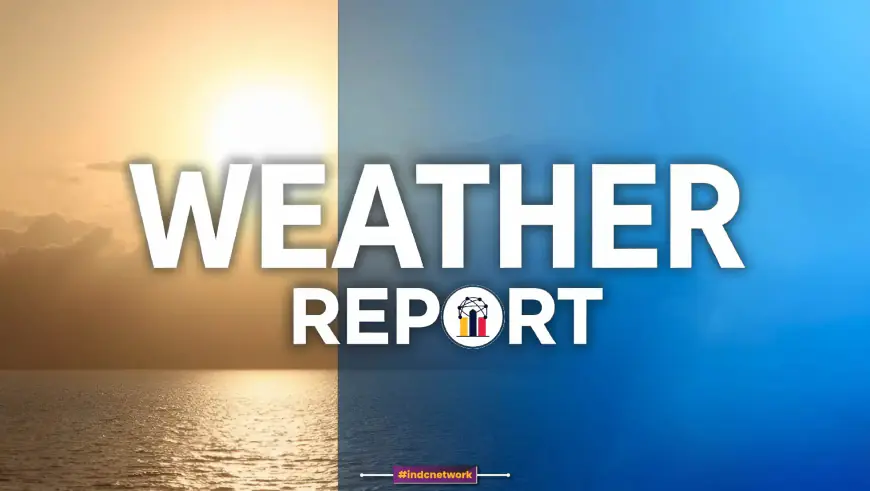Weather of three colors: Snow in Kashmir, fog in Delhi, rain in Tamil Nadu - nationwide warning
These days, the country is witnessing three colours of weather: snowfall in North India, pollution-induced haze in the plains and heavy rains due to the retreating monsoon in South India. Fresh snowfall in Kashmir, AQI crossing 400 in Delhi-Haryana, and school closures in Tamil Nadu are making it clear that India is experiencing different colours of weather. The Supreme Court has also taken a tough stand on pollution, calling clean environment a fundamental right.

INDC Network : Weather : Weather of three colours: Snow in Kashmir, fog in Delhi, rain in Tamil Nadu - warning across the country
Snowfall in Kashmir: Winter has arrived
Winter has started in North India, especially in Jammu and Kashmir and Himachal Pradesh, the feeling of winter has increased due to snowfall. The first snowfall of the season has been recorded at Kupwara, Gurez, Pir Panjal Range, Sonamarg, and Zojila Pass of Ladakh in Kashmir Valley. This snowfall has not only increased the beauty of the area, but the temperature has also dropped drastically. Due to this, there is a possibility of difficulties on the road and disruptions in traffic. This is the first sign of the season that cold is knocking fast in North India.
Smog and pollution wreak havoc in Delhi-Haryana
The effect of smog and pollution is clearly visible in the plains, especially Delhi, Haryana, Punjab, and Uttar Pradesh. The Air Quality Index (AQI) has crossed 400 in many parts of Delhi-Haryana, which is considered a very dangerous situation. A yellow alert has been issued in five districts of Punjab - Gurdaspur, Amritsar, Tarn Taran, Ferozepur, and Fazilka, where the effect of smog may remain till November 14. Due to air pollution, the citizens of Delhi are facing respiratory problems. The Supreme Court has also taken a tough stand on this issue and declared clean environment as a fundamental right and has said to take necessary steps for pollution control.
Heavy rains in South India: Schools closed in Tamil Nadu
Monsoon, returning to South India, has started torrential rains in Chennai, Tiruvallur, Kanchipuram, Chengalpattu, Cuddalore, Nagapattinam, and other districts of Tamil Nadu. Due to this heavy rain, schools have been closed in Chennai today, and waterlogging situation persists. Rains are expected to continue in the coming days, which may affect life in the state. The Meteorological Department has issued a heavy rain alert for the next few days.
Rajasthan and Himachal: Cold likely to increase
Cold conditions are gradually intensifying in Rajasthan. The temperature in Mount Abu has reached 10 degrees Celsius and cold is expected to increase in the state from 19-20 November. According to the Meteorological Department, there is a possibility of snowfall and increase in cold in Jammu and Kashmir and Ladakh region due to Western Disturbance becoming active from 14 November. Similarly, there has been light snowfall in the high altitude areas of Lahaul Spiti in Himachal Pradesh, but drought-like conditions have also persisted in the state due to 98 percent less rainfall than normal.
Preparation for cold wave in Madhya Pradesh
Madhya Pradesh is expected to experience cold wave conditions for 20-22 days in December-January this year. The effect of cold has already started showing in cities like Bhopal, Indore and Ujjain, and Pachmarhi has been the coldest place in the state. In the first 10 days of November, the temperature here has been recorded at 10.6 degrees Celsius.
Chhattisgarh and UP: Slight changes expected
A slight change in the weather can be seen in Chhattisgarh for the next few days. Due to the weather system formed in the Bay of Bengal, there is a possibility of light clouds in the districts of Bastar division, but there will be no significant change in temperature. Similarly, meteorologists in Lucknow, Uttar Pradesh said that the month of November will be warmer than normal, and there is no possibility of change in it.
Supreme Court's strictness against pollution
The Supreme Court took a tough stand against pollution on November 11 and said that living in a pollution-free environment is a fundamental right of every citizen under Article 21 of the Indian Constitution. A bench of Justice Abhay S Oak and Justice Augustine George Masih made this remark while hearing a petition filed against the burning of firecrackers and stubble. This step of the Supreme Court can be helpful in stopping the increasing effects of pollution.
What's Your Reaction?














































































































































































